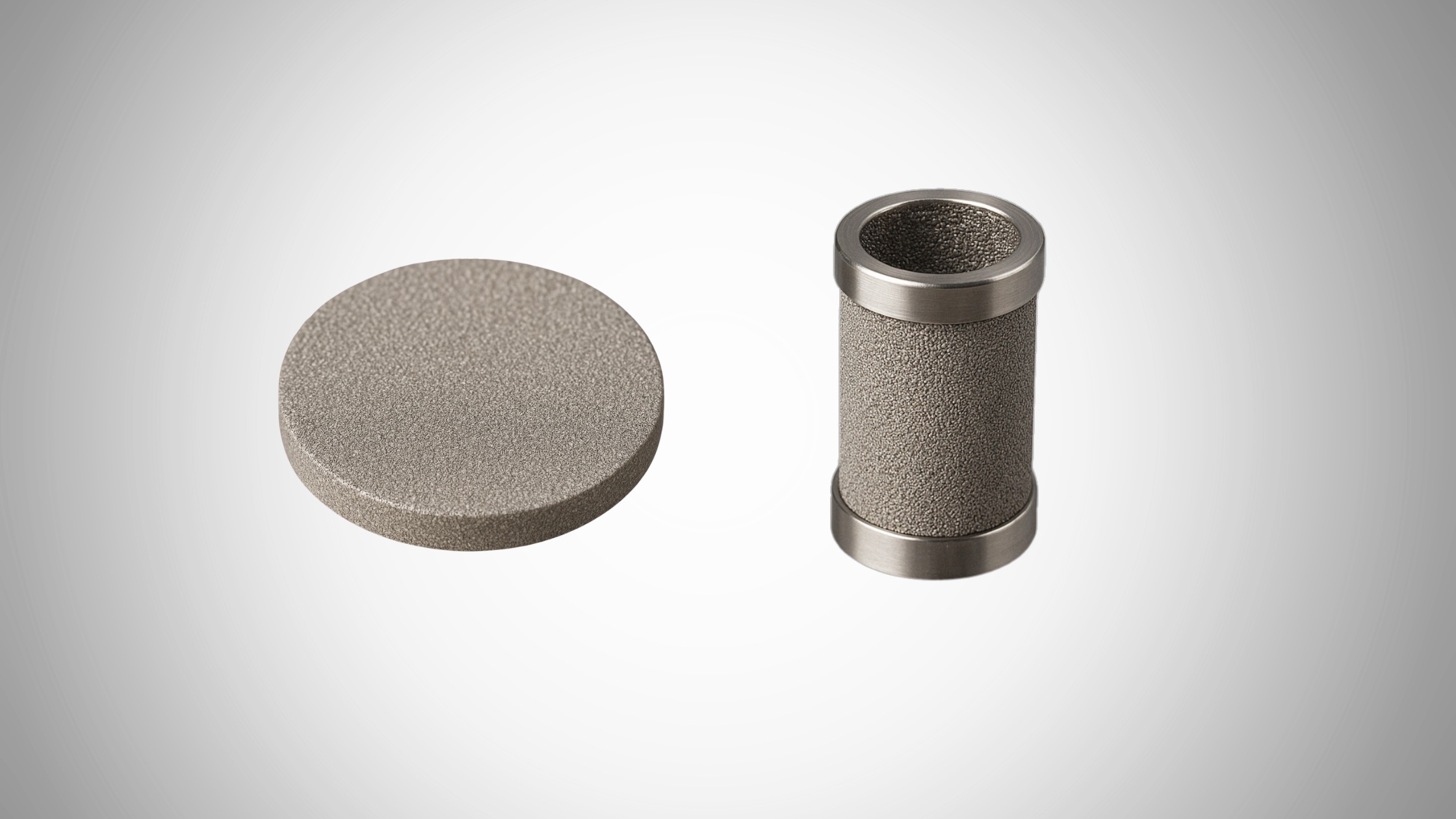
Filtration Systems and Porous Stainless Steel: Expanding the Possibilities of Sintered Metal Filters
When it comes to industrial filtration, the materials you choose can make all the difference. In recent years, sintered metal filters have emerged as a viable solution for applications requiring durability, consistency, and chemical resistance. Among these, sintered stainless steel filters are proving especially promising across a wide range of demanding environments.
What are Sintered Metal Filters?
Sintered metal filters are made by compacting and heating metal powders just below their melting point. This process, known as metal sintering, creates a strong, porous structure with uniform pore sizes allowing for precise filtration. These filters strike a unique balance between strength and permeability, ideal for separating particles in high-pressure or high-temperature systems where traditional media might fail.
The compaction process occurs at a lower than typical density to maintain porosity. By increasing or decreasing compaction pressure, manufacturers can fine-tune the pore size and flow characteristics of the filter.
Depending on the application, materials like bronze, nickel, or stainless steel can be used in the sintering process. Of those options, sintered stainless steel filters stand out for their corrosion resistance, making them a great choice in harsh environments or where hygiene is critical (think chemical processing, food and beverage, or pharmaceutical manufacturing).
Comparing Sintered Metal to Other Filter Media
When selecting a filtration medium, it's important to weigh the trade-offs between different materials. Sintered metal filters stand out not just for their performance, but also for how they hold up over time compared to other common filter types like polymers, ceramics, and woven wire.
Polymer Filters
Polymer-based filters are often inexpensive and lightweight, but they typically have a shorter lifespan and are limited in high-temperature or chemically aggressive environments. They’re usually single-use, which can add to long-term operational costs.
Ceramic Filters
Ceramics offer excellent heat resistance and chemical compatibility, making them suitable for certain industrial processes. However, they can be brittle, especially in systems that involve pressure fluctuations or mechanical shock. That fragility can lead to higher replacement rates.
Woven Wire Filters
Woven wire mesh is a familiar choice for many applications and can be cost-effective. However, its filtration precision isn’t as consistent as metal sintered filters, which have uniform pore sizes throughout the structure. Woven mesh can also clog more easily and isn’t always suitable for fine particulate filtration.
Sintered Metal Filters
In contrast, sinter metal filters combine durability, temperature and chemical resistance, and reusability in one package. Their rigid, porous structure allows for effective backflushing or ultrasonic cleaning, reducing downtime and replacement frequency. Over the life of the system, that can translate into a lower total cost of ownership, even if the upfront cost is higher.
Whether you're looking to improve efficiency, extend maintenance intervals, or handle extreme conditions, sintered metal filters offer a well-rounded solution that pays off in performance and reliability.
The Advantages of Stainless Steel in Filtration
So, how does stainless steel stand out after comparing other filter media?
- Strength and durability in demanding environments
- Consistent and precise filtration
- Excellent chemical and thermal resistance
- Reusable and easy to clean
- Sustainability and cost efficiency
1. Strength and Durability in Demanding Environments
Sintered stainless steel offers exceptional durability. Filters made from 300 series stainless steel, for example, resist rust and corrosion while maintaining structural integrity even under thermal or mechanical stress. That means fewer breakdowns and a longer operational life.
2. Consistent and Precise Filtration
Thanks to the uniform pore structure created during the sintering process, sintered metal filters deliver highly predictable performance. Flow rates and retention levels stay consistent over time, which is critical in tightly controlled applications.
3. Excellent Chemical and Thermal Resistance
Stainless steel is naturally corrosion-resistant and can handle aggressive chemicals and elevated temperatures without compromising performance. This makes sintered stainless steel filters ideal for chemical processing, gas filtration, and other high-demand industries.
4. Reusable and Easy to Clean
Unlike disposable filter media, sintered metal filters can be cleaned and reused many times. Whether using backflushing, ultrasonic cleaning, or solvent baths, maintenance is simple – and that adds up to long-term cost savings.
5. Sustainability and Cost Efficiency
While the upfront investment may be higher, the extended lifespan and reusability of sintered filters offer a lower total cost of ownership. Fewer replacements and less waste make them a sustainable choice for operations focused on efficiency and environmental impact.
Sintered Stainless Filtration Systems: Versatility Across Industries
Whether dealing with aggressive chemicals, extreme temperatures, or fine particulates, metal sintering filters can be customized to your needs. Common applications include:
- Gas and liquid filtration in chemical plants
- Backflushing filters for water treatment
- Dust collection in high-temperature processes
- Flow control and noise attenuation in pneumatic systems
Because of the manufacturing flexibility, filters can be produced in various shapes, sizes, and porosities, giving you maximum control over your filtration solution.
Future-Ready Filtration with Sintered Stainless Steel
As industries push for smarter, more resilient systems, metal-sintered filters are helping companies meet higher performance and reliability standards. With their long lifespan, customizable properties, and environmental advantages, sintered stainless steel filters are more than just a trend – they’re a strategic upgrade.
If you’re exploring ways to enhance your filtration systems or reduce maintenance costs without sacrificing quality, it might be time to take a closer look at what sintered metal can do for you.
